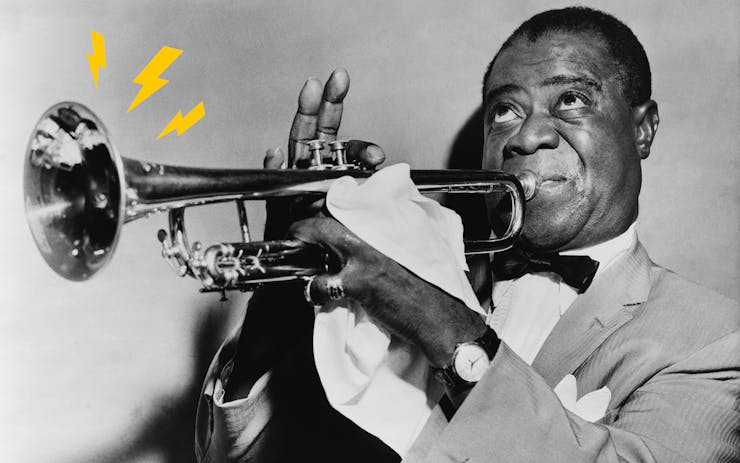The second installment of the Harry Potter prequels, Fantastic Beasts: The Crimes of Grindelwald, comes out Thursday, but it may be missing its muggles.
Author J.K. Rowling made “muggles”— her word for non-magical humans—so popular that scholars added it to the Oxford English Dictionary in 2003. But strangely, when the first prequel to the movies, Fantastic Beastsand Where to Find Them was released in 2016, writers changed “muggle” into “no-maj,” to the consternation of her fans. The film’s 1920s New York City setting exactly matches the time period when and where “muggles” had a much different meaning.
“I feel like she hijacked my name, and made it non-magical.”
Really the Blues, the autobiography of jazz clarinetist and 1920s Harlem weed dealer “Mezz” Mezzrow, contains a glossary defining the hip lingo used at the time. In that language, muggles means “cigarettes of marijuana.” Newspapers used the term in headlines about “giggle-easy” busts made in those years, when cannabis inspired jazz musicians.Ready To Switch To Legal Cannabis?Hemp historian Michael Aldrich, author of perhaps the first Ph.D. dissertation on marijuana in the US back in 1970, thinks the term muggles derives from “smuggle,” a theory that meets the Occam’s razor test as the simple and obvious answer: Marijuana was being smuggled into the US through the port of New Orleans when the term became popular. Aldrich further points out that a “reefer” can mean either a “coat worn by a sailor” or a “refrigerator on a boat”, both of which could easily help smuggle in muggles.
Marijuana-lover Louis Armstrong’s 1928 recording “Muggles” is known in jazz history as the first one to feature improvisation, Aldrich says. Louis plays around with the melody and the tempo in the third verse, bringing it back to a dreamier rhythm in the fourth. It’s likely Armstrong recorded the track on cannabis. He was a “lifelong connoisseur.”
Even white folks used to call cannabis “muggles” back in the day.
Village Voice jazz critic Gary Giddins wrote in his biography of Bing Crosby’s early years that, “Louis [Armstrong]’s influence on Bing extended to his love of marijuana, which he alternately called mezz (after Mezz Mezzrow), gage, pot, or muggles.”
Looking For Legal Muggles? Leafly Has All Your Local Menus
White jazz legend Hoagy Carmichael— in his autobiography The Stardust Road— writes about an evening listening to Armstrong play in the summer of 1923:
“Then the muggles took effect and my body got light. Every note Louis hit was perfection. I ran to the piano and took the place of Louis’s wife. They swung into Royal Garden Blues. I had never heard the tune before, but somehow I knew every note. I couldn’t miss. I was floating in a strange deep-blue whirlpool of jazz .”
In her book High Times, Hard Times, singer Anita O’Day writes about how the 1943 marijuana arrest of drummer/bandleader Gene Krupa “really bugged me,” adding:
Shop highly rated dispensaries near you
Showing you dispensaries near“I’d been smoking grass since I was a kid without any terrible effects. Reefer Madness, now a camp classic, was still regarded as a cautionary tale of the evils worked by tea, muggles, mary jane, gage, hemp, marijuana or whatever you wanted to call it.”
I caught up with the Bay Area musician who has gone by the name Mugg Muggles since the late 1970s at the longstanding Wednesday night open mike at Missouri Lounge in Berkeley, CA. where he played songs by Jessie Mae Hemphill and Charlie Rich on an electric ukulele.
Mugg first read “Really the Blues” in 1967, while he was still in high school and investigating cannabis, deciding whether to try it or not. Meanwhile, he started listening to Mezzrow’s French recordings with Sidney Bechet. One day, he was either listening to Mezz or reading about him, and the name came to him, possibly inspired by the character Og Oggleby in WC Fields’s movie “The Bank Dick.”
Rowling has claimed she didn’t know of any association between muggles and marijuana when she coined the term, starting instead from the word “mug,” meaning a gullible person.
“I feel like she hijacked my name, and made it non-magical,” Mugg laments. “I’ve done a lot to show I can be ‘marijuana magical’; now I’m a wannabe wizard.”
Older folks and musicians immediately get the connection to marijuana when they hear his name, he said. Now, younger folks and less jazz-oriented people instead make a connection to Harry Potter.
“But I’m quick to correct them and say there was a previous incarnation of the word, and it’s still incarnate among the cognoscenti,” he says.





